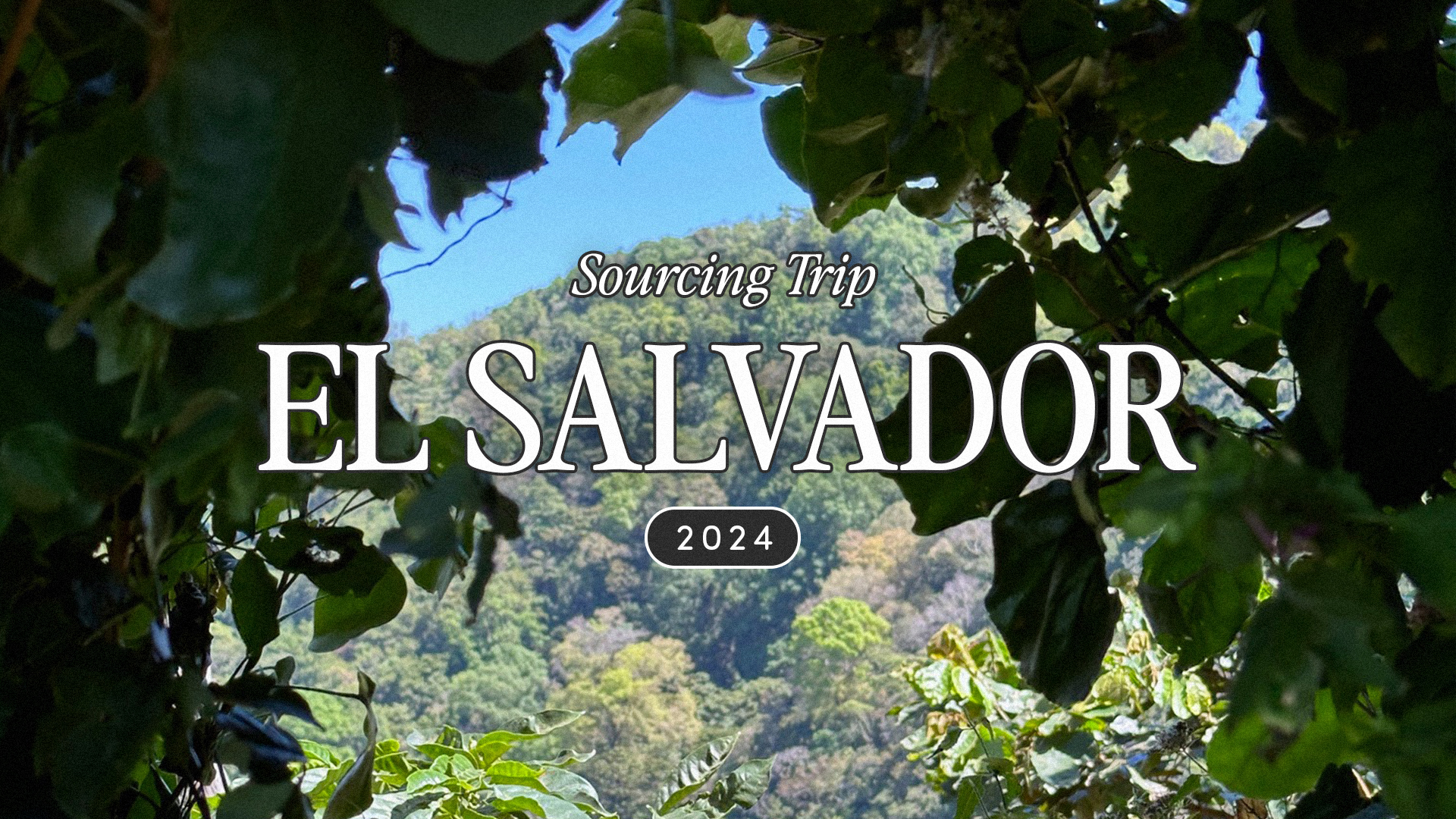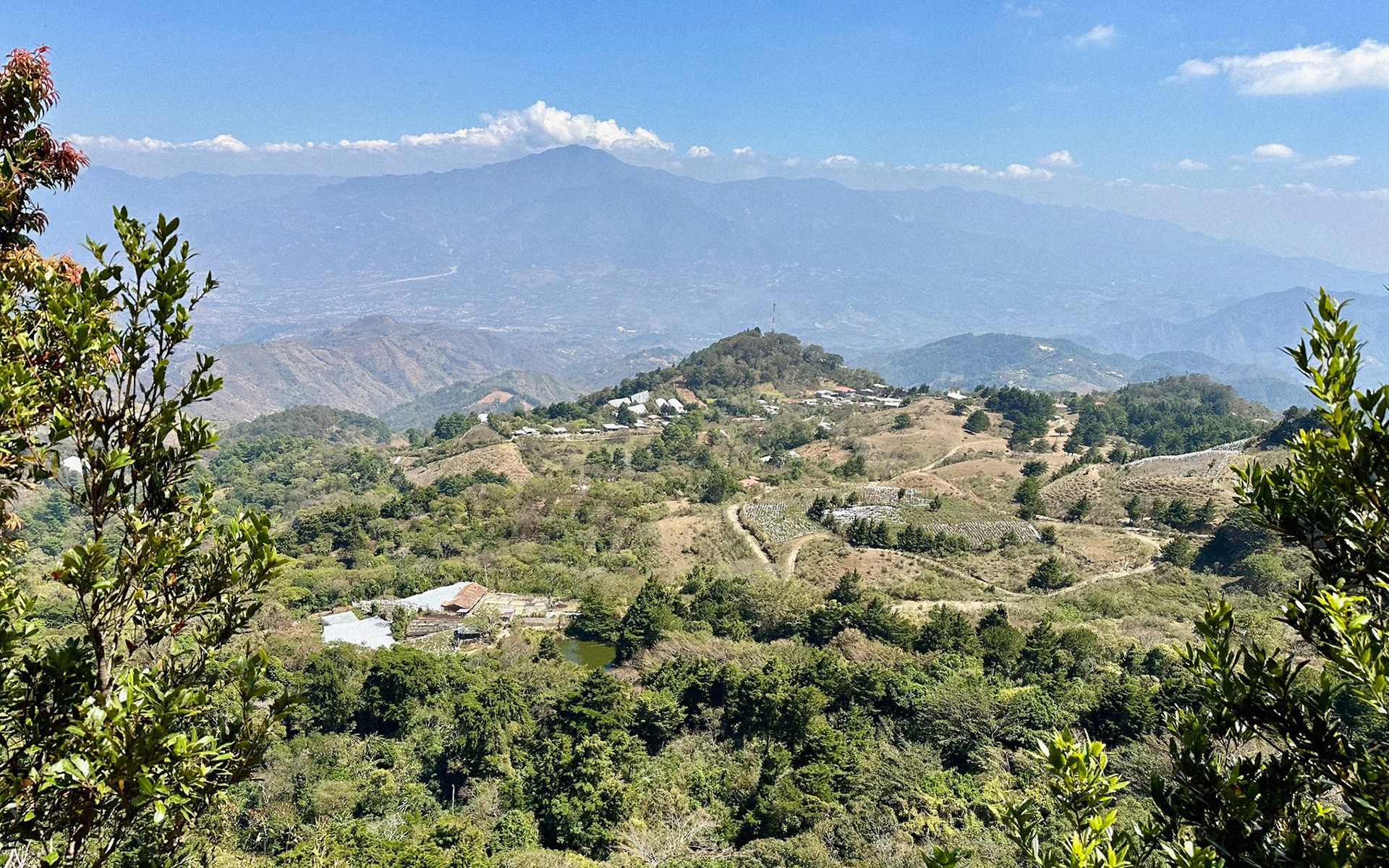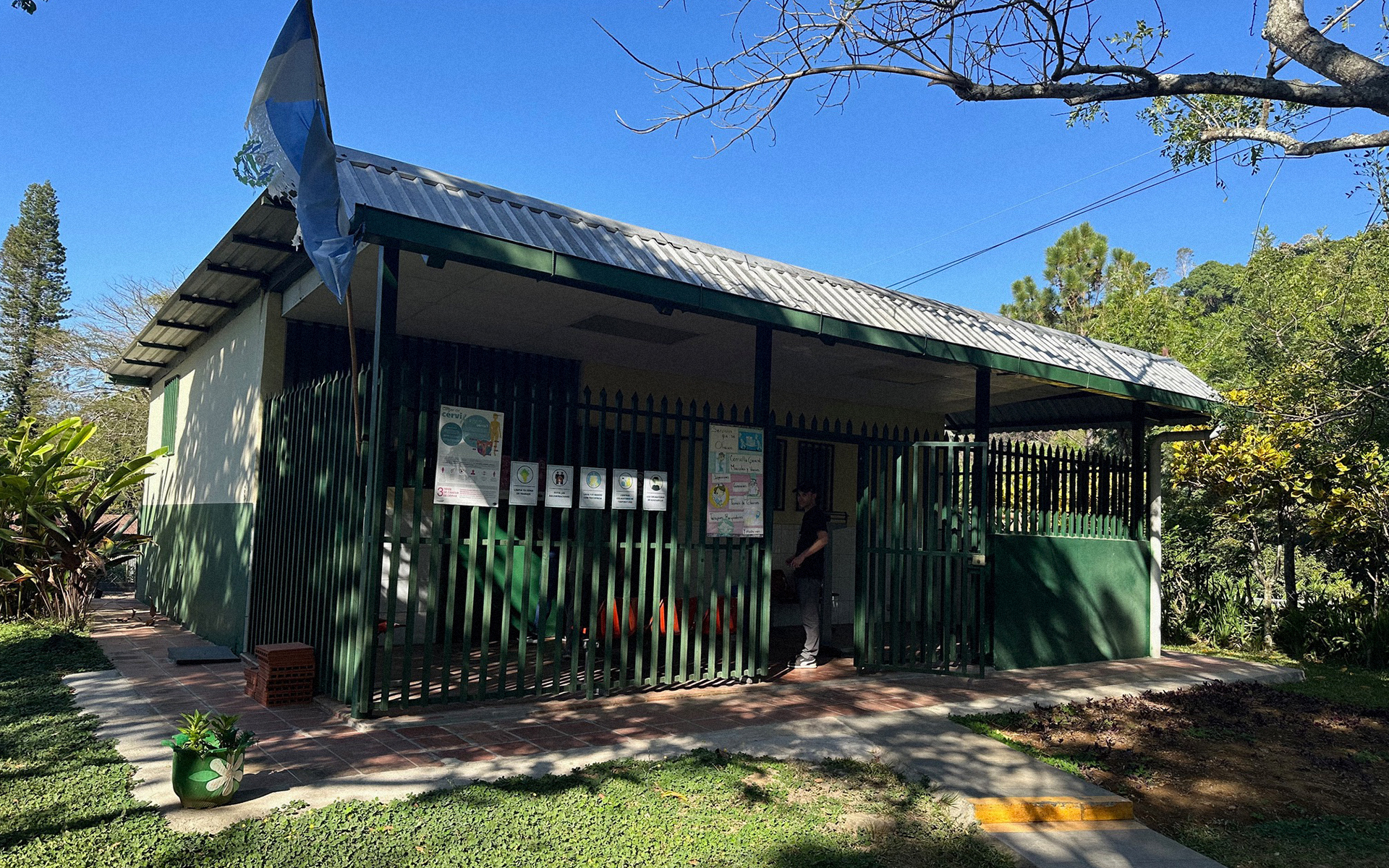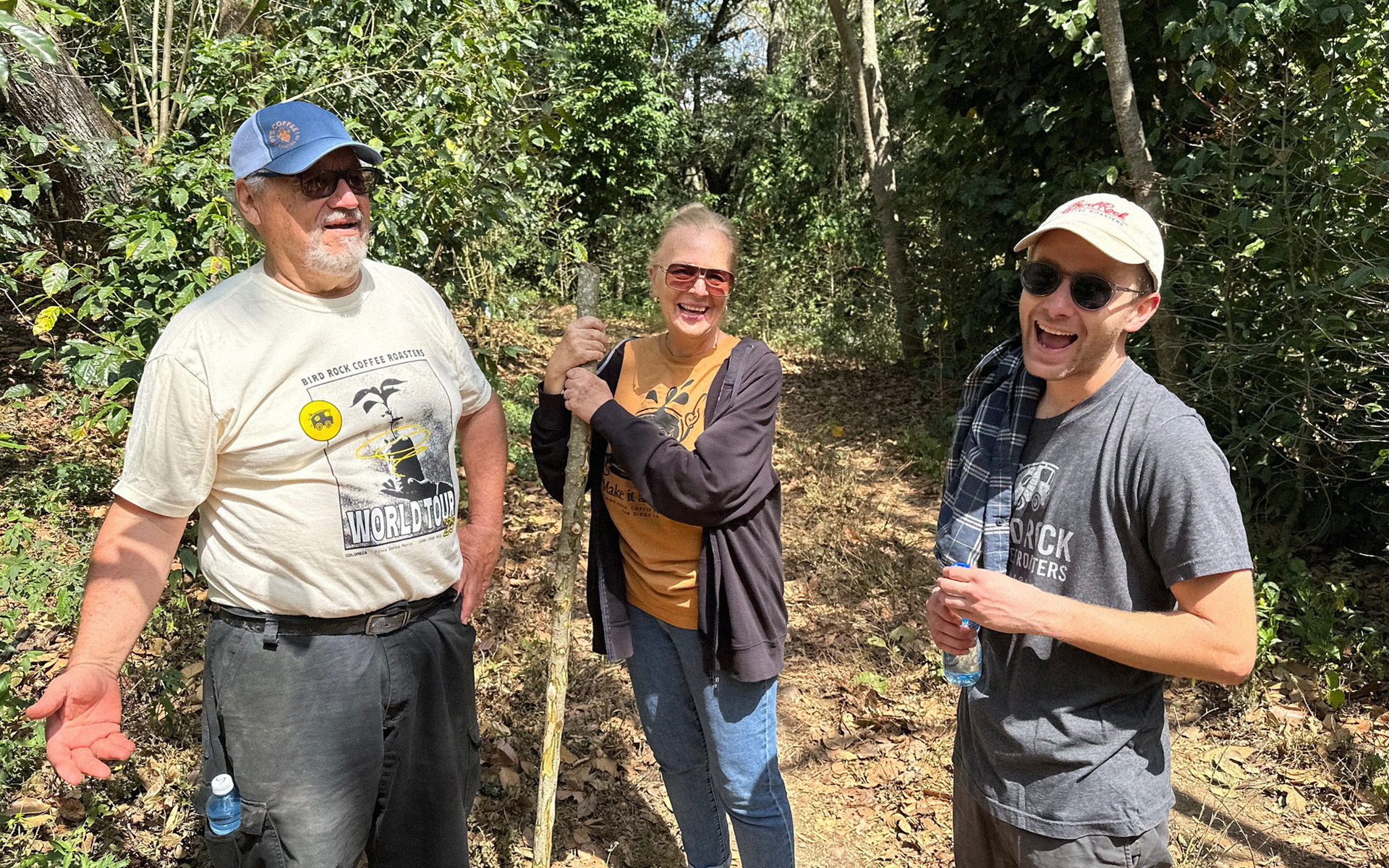El Salvador Origin Trip with Roaster Patrick

Hello, my name is Patrick Rice, and I have been employed by Bird Rock Coffee Roasters since September 2020. It has been such a pleasure working for this amazing company. I have had the opportunity to build many friendships with coworkers and further my coffee knowledge each day. Currently, I am roasting beans from numerous countries of origin in our production facilities to fulfill customers' orders across various platforms. This past February, I was given the opportunity to go on my first coffee-origin trip to El Salvador, and it did not disappoint! In this blog, I will be detailing my trip from what I saw, learned, and the people that I met.

On my first day in El Salvador, I stayed in a hotel in the capital city of San Salvador and took a day trip to the first farm, Las Mercedes. San Salvador is a very fast-paced city with friendly people, great food, and an amazing culture. This was my first trip to a Spanish-speaking country, and I enjoyed every second. We started out on a two-hour drive to the eastern side of El Salvador to a mountainous region near Santiago de Maria. The farm itself was located high in the mountains of Cerro El Tigre. The views and landmarks we saw on the way were incredible. The Lempa River was one of the landmarks we encountered. It runs from North to South through all of El Salvador, and eventually, it meets the Pacific Ocean.
To start, I had the chance to meet Lucia Ortiz. Lucia is a fourth-generation coffee producer from Finca Las Mercedes, who has had a longstanding direct trade partnership with Bird Rock Coffee Roasters. Las Mercedes has been an operational farm for 130 years, while The Ortiz Family started operating the farm themselves in 1997. In 2007, Las Mercedes won a prestigious award called the Cup of Excellence. Within the specialty coffee world, this is a huge deal and something to be very proud of. When a farm or coffee company receives the Cup of Excellence award, it can act as reassurance that the processes being used are working well. Lucia immediately provided us with great hospitality and kindness. This made me feel very comfortable to ask questions and learn as much as possible about this historic farm.
When we arrived at Finca Las Mercedes, we took a group tour of the property.I was amazed at the long history of farming and agriculture in the Ortiz family. Las Mercedes is a rather large farm. I was enamored by the sheer size of this place. In total, Las Mercedes was 168 hectares of land, which roughly equals 415 acres. There are three sections on this farm. The first is referred to as Las Mercedes, the second is La Primavera, and the third is known as La Avila. As a group, we toured each one of these sections by truck, and the views from the tops of the mountains were incredible. Here at Bird Rock Coffee Roasters, I have been fortunate enough to roast and drink multiple lots from each of these sections of the farm. Currently, we are offering a coffee from La Avila, known as the Graduation lot, and also a coffee from La Primavera, which is an SL28 variety. The graduation lot at La Avila was named after Lucia's son, who graduated from college a few years ago when the lot was first planted.

Before arriving at Las Mercedes, I was very curious as to how all of these crops were watered and maintained. Rainwater harvesting is crucial to Las Mercedes' sustainable agriculture. It ensures that the operating costs stay down, which allows Lucia and her manager to allocate funds to other problems or necessities. There are at least five large water storage tanks around the grounds to help distribute water to crops. Not only do Lucia and her team grow coffee, but they have an assortment of fruits and vegetables in a large nursery. Some crops that I saw in the nursery include tomatoes, cacao, carrots, and broccoli. Lucia sells fruits and vegetables at the local market and also distributes surpluses to her workers and their families.
On the farm, I was able to see a classroom Lucia funded for her workers and a hospital Lucia had built for the people working the land. This hospital provides resources for these people who might not have the opportunity to be checked out by a doctor or nurse. It was very impressive to me how much she cares for each one of the pickers and looks out for their well-being. She also provides transportation for the workers who are unable to travel to the farm on their own each day. This ensures they are able to continue to make a living on the farm and to provide for their families. Recently, farm owners in El Salvador have been finding it hard to keep employees working on the farm due to various reasons. Currently, Las Mercedes has about forty workers working the land. In the past, that number was closer to 120 workers.

Specialty coffee farms are always at a very high altitude, which provides optimal growing conditions. Las Mercedes had a range of 1100-1600 Meters above sea level. While in particular the La Avila section of the farm has the highest altitude at 1550-1600 meters above sea level. The types of foliage on these immense mountains really accentuated the different textures and colors all around me.
Currently, eleven varieties of coffee are being grown here. Some of those varieties include Bourbons, Tabis, Pacamaras, and Geshas. In the group I was touring with, I tasted cherries from most of the varieties currently being harvested. The Gesha cherries were my favorite. They tasted like peaches and dried apricots, which are a few of my favorite fruits. The oldest Pacamara lots at Las Mercedes were up to 60 years old. Another variety I was shown was Pepinal 1 and Pepinal 2. Lucia and her team have been processing these Pepinal lots as a honey process, which has been a favorite of companies that are buying from her. About 60 percent of the coffees Lucia grows are honey-processed. Generally, Lucia dried these honey-processed coffees for 3 days on large patios, then she and her team moved them from the patios to raised beds to continue drying for roughly 21 days, depending on the weather that month.
Traceability is extremely important for Las Mercedes. Lucia and her team do this for many different reasons. A few of those reasons are to track the progress of these coffees being grown, the amount of cherries she yields from lots, and eventually how they taste in cupping evaluations after the process of choice is used and the beans are roasted.

On the second day spent with Lucia, we were able to tour a dry mill with which Lucia works closely. We spent the day cupping coffees from Las Mercedes to evaluate different lots on the farm and to get a better idea of flavor notes from these different processes being used at Las Mercedes.I really enjoyed this part of my trip to further my coffee knowledge and see how these coffees compare to each other.When cupping these coffees, it was a little tricky because of the number of lots we cupped, all from the same farm and country of origin. The Pepinal 2 was my favorite on the cupping table. It had notes of cinnamon and chocolate.
I am so grateful for the opportunity Bird Rock and Lucia gave me to come visit. Lucia was a great host and made me feel like I was family. If the opportunity ever comes about again, I would love to visit the farm again and see my good friends at Las Mercedes.

After an unbelievable few days spent with Lucia at Las Mercedes, the group and I moved on to the next and final stop of my origin trip at Finca Los Planes. This farm was in the northern part of El Salvador, in an area called Chalatenango. This mountainous region is unique because it sits on the border of three countries. (El Salvador, Guatemala and Honduras) Traveling here from San Salvador gave me the opportunity to see even more of this beautiful country. We passed through many small towns on our way. My favorite was called La Palma, which had beautiful old architecture and was very colorful. This place had so much culture wrapped into this small mountain town. Colorful murals and art were on every street. There was even a festival going on here, with live music and people shopping for fresh produce.
The owners of Finca Los Planes are Isabel and Sergio Ticas. Sergio is a local of Chalatenango. It was apparent to me how much Sergio cared about the people of his hometown and the quality of coffee he was producing. Sergio and Isabel started production on Los Planes more than twenty years ago and have been harvesting ever since. In 2006, Sergio and Isabel placed second in The El Salvador Cup of Excellence competition. As explained before, this is a huge accomplishment and provided Los Planes with additional funds to improve operations and processes on the farm. The owner of Bird Rock Coffee Roasters, Jeff Taylor, has become extremely close with Isabel and Sergio, which has led to a seamless direct trade partnership between the farm and Bird Rock Coffee Roasters.

The neighboring Families around Chalatenango are the laborers on the farm which in turn causes the workers to also have an interest in how each annual harvest turns out. Since the start of production at Los Planes, Sergio and Isabel have spent a lot of time giving back to the community. Sergio and Isabel built a soccer field and a common area where festivals are held in the community that includes fire pits and picnic tables. This area of Chalatenango really seems like one big family that looks out for one another.
Los Planes and Las Mercedes were a little different from each other. Finca Los Planes is more artisanal and hand-crafted, while Las Mercedes seemed a little more developed and had more machinery. It was also a fraction of the size of Las Mercedes, and there were a lot fewer workers at Los Planes, too. This was really beneficial for me to see either side of the spectrum in terms of operation sizes in coffee agriculture while still producing excellent coffee.
On the first day, I had the chance to explore the grounds at Los Planes. I saw some extremely old trees and native plants around the farm. I tried a new fruit I had never seen before, which was a cross between a lime and an orange. Isabel and Sergio referred to the fruit as a naranja lima. These were so enjoyable and refreshing while we hiked. It tasted a lot less acidic than a lime. Similar to Las Mercedes, Isabel and Sergio had tomatoes growing on their land. This seemed to be a trend for coffee farms in El Salvador to bring in extra income to the farm and community.
At Los Planes, they do honey, washed, and natural processing. I was able to witness them sort coffee cherries, and they were some of the most vibrant red cherries I have ever seen. They looked perfect. When they are sorting these cherries before de-pulping them, they pick out ripe ones and under-ripe ones. These less desired cherries are not discarded because they can still be sent to coffee companies that are not considered specialty coffee. If they do not pick these undesired cherries off of the plant, it affects the following year's harvest because they wouldn't be allowing new cherries to grow in their place.A cool fact I learned about coffee plants is that there is a fungus called La Roya that grows on some plants. This fungus looks like rust spots on the leaves and doesn't allow the plant to produce cherries anymore.
The different lots at Los Planes are named after different landmarks they are planted by on the farm. One of those lots I am referring to is called Lagunita, which is located next to a lagoon in the middle of the farm. Another lot is named Cipresal due to its close proximity to cypress trees. Just like Las Mercedes, this helps Los Planes with traceability. I was very excited to see where Los Planes chose to grow their Gesha lots on the farm. I learned from both farms that a lot of thought is put into the location where Gesha coffee lots are grown. These lots at both farms were placed at the highest elevation possible on each property. They also had plenty of tree coverage to shield these delicate plants from wind and anything else that would disrupt their growth.
After a long day of hiking and exploring Los Planes, Isabel and Sergio treated us to a homemade meal for dinner. We had authentic Pupusas, which were amazing. In El Salvador these are considered the national dish. They are like flatbreads, made with cornmeal or rice flour and filled with cheese and topped with tomato salsa. Normally they are paired with a fermented cabbage slaw.This was one of my favorite meals of the trip.

On my last full day in El Salvador, I witnessed the team there process a coffee lot called La Muela. La Muela is a Pacamara and is one of the biggest beans I have seen since being a part of Bird Rock Coffee Roasters. First, the coffee cherries were handpicked based on color. Then, the desired cherries were sent into a bath that was sorted by density. Eventually, it fed into the de-pulping machine, which de-pulped the cherries from the beans inside. After the de-pulping machine, the beans get sent down another pipe to pass through a large rotating screen. This screen was being used to filter out beans that were undersized or too large. From the screen, they fall into a large holding area. At this point, there is mucilage on the beans. The mucilage is a slimy substance. After a certain amount of time, they rub these beans together by hand to listen to the sound the beans make. If they hear the right sound, they begin washing and agitating the mucilage off the beans. The team used rakes to mix these beans up, and water flowed to get the mucilage off. From there, the La Muela beans were spread out on large tarps for a few days to dry out. This completed the washed process. This whole process was so insightful for me.
When we left the processing mill, we returned to the house to see that Sergio had purchased a shiny, new, three-wheeled motorcycle. This bike was specifically bought to help the pickers transport coffee cherries. Everyone at the farm was extremely excited because this would make their jobs easier. While I was at the mill earlier that day, I carried a few large bags of coffee cherries, and they were quite heavy. So, I knew this motorcycle would be of great help.

These four days spent in El Salvador made me very appreciative of everything that goes into coffee agriculture. I now realize how many people play a role in specialty coffee, from the farm to your local café. I made some great relationships here and memories that will last me a lifetime. I can't thank Jeff and Maritza Taylor enough for allowing me to travel to a new country with work. I also have to give thanks to two of my co-workers who accompanied me on the trip, Jacob and Brent. These two were lifesavers. They helped me with some Spanish words that I did not recognize and taught me so much based on their experience and knowledge from visiting numerous other farms. And, of course, the three farm owners I met and interacted with, Lucia Ortiz, Sergio Ticas, and Isabel Ticas, for showing me their beautiful farms. This concludes my blog. Until next time El Salvador!
May 13th 2024

